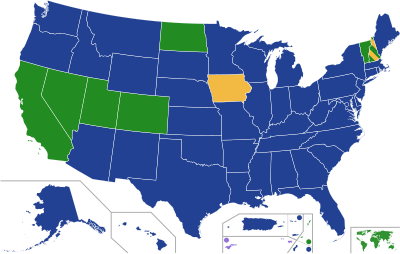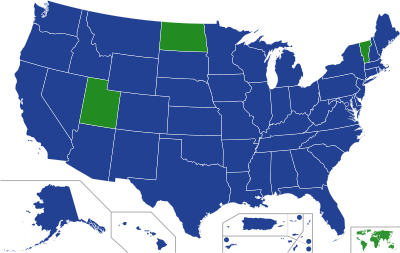
Back الانتخابات الرئاسية التمهيدية للحزب الديمقراطي 2020 Arabic Prezidentské primárky Demokratické strany USA 2020 Czech Vorwahlergebnisse der Präsidentschaftswahl in den Vereinigten Staaten 2020 German Primarias presidenciales del Partido Demócrata de 2020 Spanish رقابتهای مقدماتی ریاستجمهوری حزب دموکرات (۲۰۲۰) Persian Primaires présidentielles du Parti démocrate américain de 2020 French הבחירות המקדימות לנשיאות ארצות הברית במפלגה הדמוקרטית 2020 HE Elezioni primarie del Partito Democratico del 2020 (Stati Uniti d'America) Italian 2020年アメリカ合衆国大統領民主党予備選挙 Japanese 2020년 미국 대통령 선거 민주당 후보 경선 Korean
| ||||||||||||||||||||||||||||||||||||||||||||||||||||||
| ||||||||||||||||||||||||||||||||||||||||||||||||||||||
|---|---|---|---|---|---|---|---|---|---|---|---|---|---|---|---|---|---|---|---|---|---|---|---|---|---|---|---|---|---|---|---|---|---|---|---|---|---|---|---|---|---|---|---|---|---|---|---|---|---|---|---|---|---|---|
| ||||||||||||||||||||||||||||||||||||||||||||||||||||||
  
| ||||||||||||||||||||||||||||||||||||||||||||||||||||||
| ||||||||||||||||||||||||||||||||||||||||||||||||||||||
| Attempts to overturn | |
|---|---|
| Democratic Party | |
| Republican Party | |
| Third parties | |
| Related races | |
| |
Presidential primaries and caucuses were organized by the Democratic Party to select the 3,979 pledged delegates to the 2020 Democratic National Convention held on August 17–20 to determine the party's nominee for president in the 2020 United States presidential election. The elections took place in all 50 U.S. states, the District of Columbia, five U.S. territories, and through Democrats Abroad, and occurred between February 3 and August 11.
A total of 29 major candidates declared their candidacies for the primaries. Former Vice President Joe Biden led polls throughout 2019, with the exception of a brief period in October when Senator Elizabeth Warren experienced a surge in support.[3] 18 of the 29 declared candidates withdrew before the formal beginning of the primary due to low polling, fundraising, and media coverage. The first primary was marred by controversy, as technical issues with vote reporting resulted in a three-day delay in vote counting in the Iowa caucus, as well as subsequent recounts. The certified results of the caucus eventually showed Mayor Pete Buttigieg winning the most delegates, while Senator Bernie Sanders won the popular vote in the state. Sanders then won the New Hampshire primary in a narrow victory over Buttigieg before comfortably winning the Nevada caucus, solidifying his status as the front-runner for the nomination.[4][5]
Biden, whose campaign fortunes had suffered from losses in Iowa, New Hampshire and Nevada, made a comeback by overwhelmingly winning the South Carolina primary, motivated by strong support from African American voters, an endorsement from South Carolina U.S. Representative Jim Clyburn, as well as Democratic establishment concerns about nominating Sanders.[6] After Biden won South Carolina, and one day before the Super Tuesday primaries, several candidates dropped out of the race and endorsed Biden in what was viewed as a consolidation of the party's moderate wing. Prior to the announcement, polling saw Sanders leading with a plurality in most Super Tuesday states.[7] Biden then won 10 out of 15 contests on Super Tuesday, beating back challenges from Sanders, Warren, and former New York City Mayor Michael Bloomberg, solidifying his lead.[7] Increasingly, as the primaries proceeded, they were overshadowed in public attention by the COVID-19 pandemic, which the World Health Organization declared to be a global pandemic on March 11, eight days after Super Tuesday.[8] Between March 19 and April 7, most states in the country issued stay-at-home orders, and the overwhelming majority of campaign activity was suspended.
On April 8, Biden became the presumptive nominee after Sanders, the only other candidate remaining, withdrew from the race.[9] In early June, Biden passed the threshold of 1,991 delegates to win the nomination.[10][11] Seven candidates received pledged delegates: Biden, Sanders, Warren, Bloomberg, Buttigieg, Senator Amy Klobuchar and U.S. Representative Tulsi Gabbard.[12] On August 11, Biden announced that former presidential candidate Senator Kamala Harris would be his running mate.[13] Biden and Harris were officially nominated for president and vice president by delegates at the Democratic National Convention on August 18 and 19.[14][15] Biden and Harris won the presidency and vice presidency in the general election on November 3, defeating the incumbents President Donald Trump and Vice President Mike Pence.
Biden became the first Democratic candidate since Bill Clinton, and the third ever Democratic candidate,[c] to win the nomination without carrying either Iowa or New Hampshire, the first two states on the primary/caucus calendar.
The primaries were initially scheduled to go through June 6. The COVID-19 pandemic in the United States caused a number of states to shift their primaries to later in the year.
- ^ a b c Stevens, Matt (February 22, 2020). "How to Win the Democratic Nomination, and Why It Could Get Complicated". The New York Times. Retrieved March 2, 2020.
- ^ "Democratic Convention – Nationwide Popular Vote". The Green Papers. Retrieved September 11, 2020.
- ^ Bump, Philip (October 10, 2019). "Warren just took the lead in a key polling average. History is vague on what happens next". The Washington Post. Retrieved October 22, 2020.
- ^ Nilsen, Ella (February 22, 2020). "Bernie Sanders just won the Nevada caucuses". Vox. Retrieved February 23, 2020.
- ^ Frostenson, Sarah (February 23, 2020). "Bernie Sanders is the Frontrunner". FiveThirtyEight. Retrieved October 22, 2020.
- ^ Korecki, Natasha; Siders, David (February 23, 2020). "Sanders sends Democratic establishment into panic mode". Politico. Retrieved October 22, 2020.
- ^ a b Korecki, Natasha (March 2, 2020). "How Biden engineered his astonishing comeback". Politico. Retrieved October 22, 2020.
- ^ "Archived: WHO Timeline – COVID-19". Word Health Organization. April 27, 2020. Archived from the original on April 29, 2020. Retrieved March 7, 2024.
- ^ Ember, Sydney (April 8, 2020). "Bernie Sanders Is Dropping Out of 2020 Democratic Race for President". The New York Times. ISSN 0362-4331. Retrieved April 8, 2020.
- ^ Detrow, Scott (June 5, 2020). "Biden Formally Clinches Democratic Nomination, While Gaining Steam Against Trump". NPR. Retrieved June 5, 2020.
The AP delegate estimate reached the magic number of 1,991 delegates for Biden as seven states and the District of Columbia continue counting votes from Tuesday's primaries
- ^ "Biden wins Guam presidential primary". The Hill. June 6, 2020. Retrieved June 7, 2020.
That gave Biden five of Guam's seven pledged delegates, pushing him over the 1,991-delegate threshold to clinch the nomination
- ^ "Delegate Tracker". interactives.ap.org. Retrieved August 13, 2020.
- ^ "Biden picks Kamala Harris as running mate, adding former 2020 rival to ticket". CBS News. August 11, 2020.
- ^ "Democrats Officially Nominate Joe Biden as Their Presidential Candidate | Voice of America – English". www.voanews.com. August 19, 2020. Retrieved August 20, 2020.
- ^ "Kamala Harris officially becomes the first black woman to be a major party's vice presidential nominee". CNN. August 20, 2020.
Cite error: There are <ref group=lower-alpha> tags or {{efn}} templates on this page, but the references will not show without a {{reflist|group=lower-alpha}} template or {{notelist}} template (see the help page).




